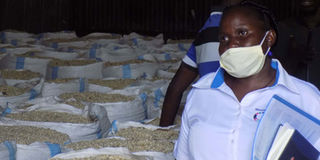Prime
Supporting farmer organisations to access regional markets

The Principal Agriculture Officer at Ministry of East African Community Affairs Mary Teddy, checks on grains at Bigando Area Cooperative Enterprise before being exported. Photo/Courtesy
What you need to know:
Without ready markets, smallholder farmers are unable to earn decent incomes from their production, and this limits their level of investment in agriculture in subsequent season
Limited access to reliable markets is one of the constraints limiting commercialisation of agriculture among smallholder farmers. Without ready markets, smallholder farmers are unable to earn decent incomes from their production, and this limits their level of investment in agriculture in subsequent seasons.
The limited markets also affect cooperatives as these may not be in position to aggregate produce from farmers, leading to underutilisation of the available storage facilities.
These observations were made by Patrick Muganga, a senior programme officer at Kilimo Trust, a non-governmental organisation promoting regional trade of agriculture commodities mainly food staples with in the East African region
Mr Muganga blames the limited access to markets by farmers on limited market research and end market engagement by farmers and other value chain actors, resulting in the mismatch between market requirements and what is supplied.
Other failures, according to Mr Muganga, include poor quality products due to poor pre and post-harvest handling, limited access to trade finance, limited preparation of farmers to fulfil requirements of identified markets and poor administration of cooperatives among others.
He gives an example of Bigando Area Cooperative, in Kasese District, which he said has been facing the above challenges but with support from Kilimo Trust, the cooperative can now access the regional market for their grains.
Why Bigando was failing on regional markets
Although the cooperative is located in a maize production hub of Kasese, with more than 600 members, within a season, the cooperative could only sell 50 Metric Tons (MT) of maize by 2018.
“Farmers were not bulking with the cooperative because they were not willing to wait for three months to be paid instead, farmers were selling their produce to middlemen at low prices,” Mr Muganga says.
Due to lack of markets, farmers were not willing to invest in production so as to have more volumes to bulk together and maintaining quality of the harvested grains as a group, taking note of the right moisture content of 13 per cent, low levels of aflatoxin, and low levels of foreign matter like stones and dust.
He adds that by the time they got in touch with the cooperative, it was depending on international food relief organisations as off takers but these couldn’t sustain the trade because they were not frequent buyers, including middlemen who were instead offering low prices for the grains.
Kilimo Trust came in to support the cooperative and linked it to reliable markets by identifying national maize buyers, in addition to regional buyers such as millers that subscribe to the Agro-processors Association of Kenya (APAK).
“After engaging these buyers, we realised that Bigando Cooperative had problems in meeting buyers’ requirements. We had to support the cooperative to get the right post-harvest handling technologies like cleaners, moisture meters, and trained cooperatives and its members on market-oriented production,” he said.
The group was also trained on how to maintain East African grain standards, financial literacy cooperative governance and management in addition to continuous business coaching.
After gaining the required skills and tools that meet market demands, the cooperative was linked to maize processors and aggregators from Kenya, through the Network of Producers and Exporters Uganda (NePEU) that brings together cooperatives and aggregators interested in tapping into regional markets.
“Through the network, buyers first deposit money on NePEU’s account worth agreed produce and volumes, usually 28MT, it’s advanced to the cooperative to mobilise produce within 2-3 days, as the network handles clearance processes,” Mr Muganga adds.
Bigando Cooperative in particular has so far sold 697 metric tons of maize to Kenyans in three months from July 2020 compared to 50 metric tons sold in the same period the previous year.
“Before the business to business engagements initiated by Kilimo Trust, the cooperative had no grain buyers. Bulking was done for between four to five months, in anticipation of a better price, only to sell at even a lower price,” Mr Jimmy Baluku, the chairperson of Bigando Cooperative says.
Mr Baluku says because of the change of their business operational model, from bulking concept to turnover, the commission earned by the cooperative has increased from Shs2m to Shs20.9m per season, which has helped the cooperative extend services such as extension to its members.
“More farmers are now joining the cooperative because they are assured of a ready market and that means more maize for us in the next season,” he adds.




